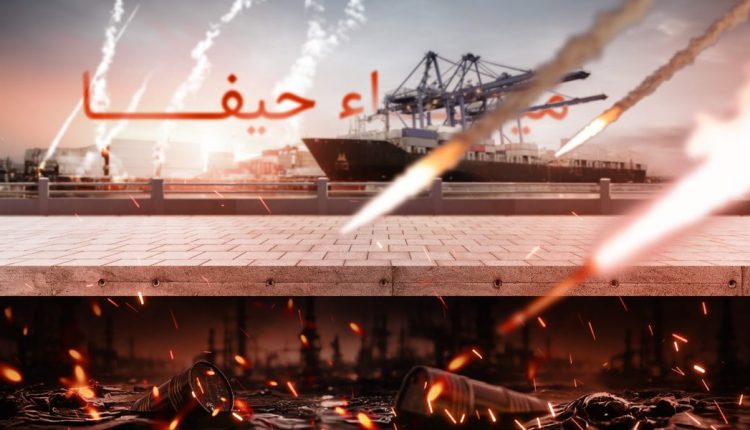Sanaa tightens its grip on Israeli entity with air and sea blockade
SANAA, May 20 (YPA) – In a significant development and a strong escalation in support of the Palestinian resistance, Sanaa forces announced the expansion of their operations against the Israeli entity to include imposing a naval blockade on the port of Haifa, in a statement issued Monday evening.
This announcement comes in direct response to what Sanaa forces described as the escalation of the brutal Israeli aggression on the Gaza Strip, resulting in daily massacres and hundreds of victims in an unprecedented crime of genocide. This is in addition to the ongoing blockade and starvation, and Israel’s refusal to halt its aggression and lift its siege on the Strip.
The statement emphasized that this decision comes “based on the directives of the leadership, with trust in God, and following the success achieved in imposing the blockade on the port of Umm al-Rashrash and bringing it to a standstill.”
The Sanaa forces called on all companies with ships present in or heading to the port of Haifa, stating that the port has been designated as a target since the statement was issued, urging them to take into consideration the contents of the statement and any subsequent releases.
Why is the port of Haifa considered the most important seaport for “Israel”?
The Port of Haifa is the largest and most diverse of all Israeli occupation ports. It plays a pivotal role in the import and export movement to the entity. It enjoys a strategic location in northern occupied Palestinian territories, close to European and Mediterranean markets.
The port also boasts multiple transportation and logistics facilities, making it a hub for sea and land transportation, enhancing its potential as a major commercial gateway for the region. It is considered a major industrial center, housing major factories and companies, some of which are linked to the chemical and petroleum industries.
This reinforces its position as a vital facility for Israeli industry and the economy.
In terms of trade volume, millions of tons of goods pass through the Port of Haifa annually. It handles more than 35% of Israel’s import and export volume, with petroleum, raw materials, industrial products, and grains being the top imports. Exports include chemicals, pharmaceuticals, advanced technologies, and more.
In 2023, the volume of trade that passed through the port was estimated at more than 30 million tons of goods, reflecting its significant role in strengthening the Israeli economy.
15 days have passed since the no-fly zone was imposed
This announcement comes fifteen days after Sana’a forces announced a comprehensive air blockade on the Israeli entity, repeatedly targeting airports, most notably Lod (Ben Gurion) Airport, in response to the Israeli escalation and expansion of its aggressive operations in Gaza.
At the time, the Yemeni government called on all international airlines to take the statement into consideration and cancel all flights to the entity’s airports, to preserve the safety of their aircraft and customers.
It stressed that “Yemen will not accept the continued violation that the entity is trying to impose, and that the nation will not fear confrontation.”
The impact of the no-fly zone has already begun to be clearly evident in the airspace over the occupied territories, with flights crashing one after the other, reflecting a strategic shift imposed by the Yemeni government forces.
A number of international airlines, including European, American, and Asian airlines, complied with this unprecedented decision, quickly suspending or canceling flights to Israeli entity.
Observers believe that this collective retreat by international airlines from resuming flights represents a strategic success for Sanaa forces in imposing a de facto air blockade on Ben Gurion Airport, especially given the continued launching of missiles and drones from Yemen toward the occupied territories.
Now, with the announcement of a naval blockade on the port of Haifa, the pressure is expanding to include another vital economic and commercial artery for the Israeli entity. The port of Haifa is considered one of the most important ports in the occupied territories and receives a large portion of the entity’s imports and exports.
Observers said that a successful naval blockade would disrupt commercial shipping, raise shipping and insurance costs, and inflict severe economic losses on the entity. It would also affect the supply of basic goods and could lead to a shortage of some materials, increasing the economic and social pressure on “Israel”.
They emphasized that the Sanaa forces’ decision to include the port of Haifa in the list of targets and to warn companies against dealing with it indicates a determination to implement the naval blockade seriously and a reluctance to take measures to ensure its implementation. This development represents a new and worrying phase for “Israeli entity”, as the air and naval blockades combine to create a double strain on its economy and trade with the outside world.
According to observers, the success of Sanaa forces in imposing these two blockades will deal a severe blow to the Israeli entity, strengthen the position of the Palestinian resistance, and push the international community to assume its responsibility for halting the Israeli aggression on Gaza and lifting the blockade—a condition set by Sanaa forces for ending their operations.
YPA


